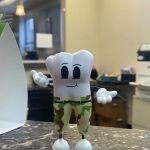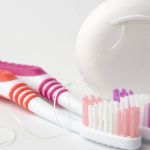Top Tips for Keeping Your Child's Teeth Healthy
As a parent, there's nothing more important than ensuring your child has a healthy smile. I remember the first time my child started showing interest in brushing their teeth. I was so excited to see them take ownership of their dental hygiene! However, like many parents, I quickly realized that good dental habits don’t come automatically. It takes guidance, patience, and consistency. Over time, I learned several valuable tips that made a big difference in maintaining my child’s oral health, and I want to share them with you.
1. Start Early: Establish Good Habits from the Beginning
Many people think that babies don’t need to worry about dental care since they don’t have teeth yet. However, I learned that taking care of a baby’s gums and setting a good foundation early on is crucial. Gently wiping your baby’s gums with a soft, damp cloth after feedings can help get them accustomed to having their mouth cleaned. As soon as their first teeth come in, I started using a soft-bristled toothbrush and a tiny smear of fluoride toothpaste.
2. Make Brushing Fun
As my child grew older, I faced the challenge of making tooth brushing a fun, daily ritual rather than a dreaded chore. Initially, it was a struggle to get them excited about it. But over time, we found ways to make brushing fun! One of the best tricks I discovered was using a colorful toothbrush featuring their favorite character. We also played fun music during brushing time and set a timer to make sure they brushed for the full two minutes.
Another trick that worked was allowing them to choose their toothpaste flavor from a kid-friendly variety. This simple decision gave them a sense of control and made brushing less of a hassle. Plus, I always reminded them of how happy their teeth would be afterward. Eventually, my child looked forward to brushing and even reminded me to do it!
3. Ensure Proper Technique
Brushing correctly is just as important as brushing consistently. I quickly realized that my child wasn’t brushing their teeth the right way, so I showed them the proper technique. We used the “pea-sized amount” rule for toothpaste and taught them to gently brush in small circular motions rather than scrubbing back and forth. I also made sure they brushed all surfaces of each tooth—front, back, and chewing surfaces—while paying extra attention to the gum line, where plaque tends to build up.
At first, it was easy for my child to forget some areas, so I made a fun game out of checking every tooth to ensure it was clean. Over time, they became more focused on brushing every part of their teeth properly. Now, they have developed a good habit and enjoy brushing thoroughly.
4. Encourage Flossing Early
Flossing can be tricky for younger children, but I found that introducing it early on helped my child get into the habit. After they learned how to brush their teeth well, we began incorporating flossing into our routine. I started with floss picks, which made it easier for them to handle and use. Flossing helps remove food particles and plaque that a toothbrush can miss, so it’s an essential step in maintaining a healthy mouth.
At first, it was a bit awkward, but I stayed patient and made it a part of our nightly routine. As they got older and more comfortable with it, my child started to take pride in flossing, knowing it was an important part of their dental health.
5. Limit Sugary Snacks and Drinks
One of the most important things I learned is that diet plays a huge role in my child’s dental health. Sugary snacks and drinks can lead to cavities and tooth decay, so I made a conscious effort to limit their intake of sugary treats. Instead of sugary sodas or juices, I offered water and milk, which are much better for their teeth. If they did have sugary snacks, I made sure they brushed their teeth afterward, or at least rinsed with water.
Additionally, I encouraged my child to eat crunchy fruits and vegetables like apples and carrots, which help clean teeth naturally. These foods are also full of vitamins that promote healthy gums and teeth. I found that small, positive changes in their diet contributed significantly to their oral health and helped prevent cavities.
6. Regular Dentist Visits
Perhaps one of the most essential steps in maintaining your child’s oral health is regular visits to the dentist. I started taking my child for their first dental checkup as soon as their first tooth appeared. Early visits allowed the dentist to monitor the development of their teeth and address any potential issues before they became bigger problems. Plus, it helped my child get comfortable with the dental office environment and reduced any anxiety about future visits.
Most pediatric dentists recommend that children have their first checkup by age one, or within six months of the first tooth emerging. Regular checkups every six months allow the dentist to spot early signs of cavities or other dental concerns. These visits also provide an opportunity for the dentist to provide helpful advice on maintaining healthy teeth at home.
7. Be a Role Model for Oral Health
As parents, we set an example for our children, and this extends to oral hygiene. I made sure to brush and floss my own teeth with my child, showing them that oral health is important for everyone. Children often model their behavior after their parents, and by brushing together, I created a sense of teamwork and made oral care feel like a family activity.
8. Use Fluoride to Strengthen Teeth
Fluoride is a key element in preventing cavities, and I made sure that my child’s toothpaste contained fluoride. Fluoride helps strengthen tooth enamel, making it more resistant to decay. I also made sure to ask the dentist about fluoride treatments during checkups, especially when my child was younger, to further protect their teeth.
In areas where the water doesn’t contain fluoride, a fluoride supplement might be recommended by your dentist. I followed their guidance to ensure that my child’s teeth were properly protected from cavities.
9. Teach Good Habits from the Start
From the time my child was old enough, I taught them that taking care of their teeth was an important part of their health routine. I explained why brushing, flossing, and regular dental visits were essential for keeping their teeth clean and strong. I made sure to praise their efforts, even when they didn’t always get it perfect, and reminded them that taking care of their teeth now would give them a beautiful smile for years to come.
10. Stay Positive About Oral Care
Last but certainly not least, I always made sure to keep a positive attitude about oral care. Instead of focusing on the negatives or the “do’s and don’ts,” I encouraged my child to see brushing as an enjoyable and rewarding experience. This positive reinforcement has paid off, as they’ve developed a strong interest in their own oral hygiene and are now excited to take care of their teeth independently.







 Family and Cosmetic Dentistry of Randolph, Dr. Anthony Fusco & Dr. Joseph Caravano5.0 (280 review)
Family and Cosmetic Dentistry of Randolph, Dr. Anthony Fusco & Dr. Joseph Caravano5.0 (280 review) Greater Portland Endodontics5.0 (14 review)
Greater Portland Endodontics5.0 (14 review) California Dental Group4.0 (235 review)
California Dental Group4.0 (235 review) Baystate Family Dental4.0 (27 review)
Baystate Family Dental4.0 (27 review) Khisti Dental Center at Chester5.0 (109 review)
Khisti Dental Center at Chester5.0 (109 review) Stacey P. Blau, DDS0.0 (0 review)
Stacey P. Blau, DDS0.0 (0 review) The Importance of Oral Health Education During Pregnancy for a Healthy Pregnancy
The Importance of Oral Health Education During Pregnancy for a Healthy Pregnancy Best Tips for Brushing Your Teeth Properly for Healthy Gums: Essential Techniques for Oral Health
Best Tips for Brushing Your Teeth Properly for Healthy Gums: Essential Techniques for Oral Health Why Skipping Dental Checkups Can Lead to Bigger Oral Health Problems
Why Skipping Dental Checkups Can Lead to Bigger Oral Health Problems Advantages of Porcelain Dental Restorations
Advantages of Porcelain Dental Restorations How Can Diabetes Cause Tooth and Gum Problems? Preventing and Managing Oral Health Issues
How Can Diabetes Cause Tooth and Gum Problems? Preventing and Managing Oral Health Issues Healthy Habits for Promoting Good Oral Health and Hygiene: Tips for a Healthy Smile
Healthy Habits for Promoting Good Oral Health and Hygiene: Tips for a Healthy Smile